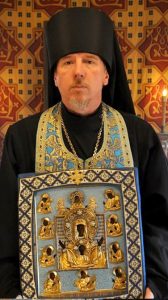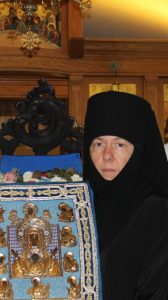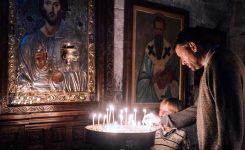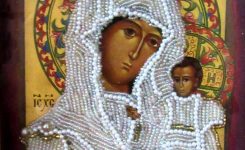monastery musings
What is the Orthodox response to adversity?
Recently, as I was praying about what inspirational words I could pass on to you, I called to mind +Hieromonk David (Pierce) of blessed memory. When Father David was diagnosed with a glioblastoma brain tumor, his life changed instantly. Following his first surgery, I visited Father David, and he venerated the holy relics that I had brought with me. He had a strong faith, was unshaken, and his eyes were fixed on eternity. We began talking about his prognosis, which led into a discussion about contemporary issues facing Orthodox Christians in an increasingly secular society where much is being done to remove “God” from its midst. The result of that visit was an article we co-authored on how the mind of an Orthodox Christian person should react when facing difficult circumstances.
Father David reposed in 2014, and we never published that article. Because of the healing nature of the Skete’s patronal Icon “Queen of All”, I thought this article might provide some fresh insight. After reading it, I encourage you to go to the “Prayer Requests” button on this website and send the names of your loved ones for commemoration.
What is the Orthodox response to adversity?
Written by +Hieromonk David (Pierce) and Mother Andrea (Nicholas)
Adversity is a fact of life. Everyone, at one point or another, is faced with some type of illness, financial loss, foreclosure, family situation or other challenge. Adversity is also relevant to the individual and to some, receiving a poor grade in school or not winning a tennis match can be enough to upset one’s apple cart. But the Orthodox Christian has mechanisms whereby we can cope in times of distress.
First, we should always keep before us the knowledge of God’s providence. You really can sit back and let God drive the car because, as our holy Father, Saint Philaret of Moscow instructs us, providence calls man to the Lord’s paths, and you are at peace. If one does not have a strong faith and does not believe in God’s providence, then despair would consume the person in times of adversity. Nothing is spinning out of control. God is allowing even the least thing and is using it to the benefit of our salvation and to our experience of happiness with Him.
In the case of life-threatening or catastrophic illnesses, our holy father Saint Isaac of Syria tells us that we must realize that God brings sickness for our advantage, for the soul’s good health, and that people who discover the purpose of this are blessed. It is at these times that the Orthodox Christian mind should avoid the pitfall of thinking “Why me?” Understanding God’s providence, the mind must be refocused to ask, “Okay, what does God want me to do now?” Suffering is more endurable when the individual concentrates on how to use that suffering to the benefit of the soul, rather than trying to understand why it happens.
We are told in the Gospel of Matthew (18:3) that we are to come to God as little children. If a little boy wants to run out onto a busy highway, his mother will grab him and yank him back, maybe even give him a little spank. As a child, he understands this message as “mom is a meanie”. We are God’s children and yet we do not understand that God allows certain things to happen, so that we will learn from them. This doesn’t mean people can’t ask God for healing — maybe that’s what God wants, is for us to ask of his mercy. When you realize something is life threatening and you have no control, then you really must trust God … a trust which should be occurring all along.
In the Gospels we are told to “Ask and you shall receive.” The Greek verb for this appears in the imperative tense, which indicates you are asking [to do something] more than once, continually or repeatedly. This tells us that we are to actually “keep asking” and we shall “keep receiving.” It is not a static verb.
If we find that our prayers are not answered by God, there are generally four reasons this may occur: 1) our request is not timely, for example, a young child cannot pray to be married “right now”; 2) our request is not the correct thing to happen for us; 3) our prayer is made in pride or by it being answered, it will lead to our pride; or 4) we don’t pray before we enter into the situation, for example, someone loses their job, but this person, when they had been comfortable in their job, had never thanked God for his blessings and had never prayed for his mercy.
Orthodoxy is not a “self-help” religion. While we do trust in God’s mercy and we do have the help of the saints, ultimately, the purpose of our faith is theosis, which is to unite ourselves to God. Many of the saints had very difficult lives, but in a spiritual sense, it was exactly their trials and tribulations and their response to these afflictions that made their lives blessed. One must work at faith just as we work at anything. Sometimes, we may find that an affliction is what God wants us to go through. Always, there is a reason behind our suffering and it is through prayer, participation in the holy Mysteries of Repentance and Communion, and openness with our spiritual father that we can discern the purpose of our suffering.
It is important for believers to partake of the “preventive medicine” given to us by the Church. Almost every Orthodox Christian knows to have their car blessed periodically. But some people think it is so that they won’t get into an accident. In actuality, the priest blesses the car so that if one does happen to get into a wreck, they will have the grace of God necessary to deal with this adversity.
Our Faith gives us many, many tools to deal with adversity. We have the holy icons, relics, oil from vigil lamps that are burning before these icons and before the relics, the holy Mystery of Unction, of Repentance and Holy Communion, we have holy water. All of these things are given to Orthodox Christians for their use and in times of affliction, we should immediately turn to the Church for help. These tools are a means that people have been given and it is foolish not to make of use it.
The “prescriptions” of how to use these tools are best given by the clergy. As an example of how one would use the tools of our Faith would be: if one is taking a chemotherapy pill at home, leave the pill beneath the icon of Saint Panteleimon all day, then before taking the pill at night, read the Gospel of Saint Mark, with special attention to 16:18, “They shall take up serpents; and if they drink any deadly thing, it shall not hurt them…”. In the case of cancer, anoint yourself with holy oils from a lamp burning before an icon of Saint Panteleimon, or of the Pantanassa icon of the Mother of God, or of Saint Nektarios of Aegina. These oils are not hard to find, one must only ask their priest or the monastics for assistance.
Often suffering is not physical, but mental in the form of anguish and unknowing. We all know we are going to die but we always believe there will be tomorrow. When a catastrophic illness happens, it is like cold water in your face. It reminds us that we can make all sorts of plans, but our life is in God’s hands. Look at the World Trade Center – the people going to work there on that fateful day had no idea that they would not be going to work the next day. Again, we must trust in God’s providence and be as little humble children before Him.
God truly does not call us to do anything without giving us the grace with which to do this. People may say, “Oh, I could never do that,” but when they are called to go through with it, they are able to endure and God fortifies them, just as the martyrs of all the ages have been given strength. Remember, God’s “…strength is made perfect in weakness” (2Cr 12:9).
How well the individual copes with suffering boils down to their perspective. In modern secular society, people want to die in their sleep. But in the Orthodox Church’s teaching, you want to be prepared. If it is a terminal illness, you are blessed because you have been given the gift of foreknowing. By God’s mercy, you have time for repentance; time to get your affairs in order; time to make amends with anyone you may have offended; time to do these things that you always intended to do but never got around to doing.
Another contemporary trial many are facing now is job loss. Let me expound first on the situation of those Orthodox Christians who have been able to keep their jobs. It is scandalous for all of us that any of our brothers and sisters in this country would ever be in the situation of a total loss of a support network because of job loss. People outside of Orthodoxy are trying to live the Gospel better than we are and have services within their denominational communities to help people in need. But some Orthodox churches have a hard time taking care of their own. In this economy [NOTE: this was written in 2013], many of our brothers and sisters in Christ are starving, losing their cars, their homes and everything is falling apart around them. Orthodox people should give from the abundance of their hearts in these times, remembering that “…the Lord blessed the latter end of Job more than his beginning…” (Job 42:12). When we are able to help and just give a dollar or two, we have a lot to answer for, again having been given the answer in the Gospel of what we are to do: “…I was [hungry] and ye gave me meat: I was thirsty, and ye gave me drink: I was a stranger and ye took me in: naked, and ye clothed me: I was sick, and ye visited me: I was in prison, and ye came unto me” (Mat 25:35-36).
As for the person who is enduring the job loss, trust in God is so necessary. He Who clothes the fields with lilies finer than Solomon’s raiment (Mat. 6:28-29) and who cares for the birds of the air (Mat. 6:26), certainly is not going to let us starve. Above everything, turn to Holy Communion for strength – it will fortify you. Rather than falling into despair, focus that energy on more prayer: prayer to Saint Xenia, patron of the jobless; prayer to our Guardian Angel; prayer to our patron saint or Slava.
We really cannot understand adversity and should not try to understand. God allows suffering to happen as a way of showing his great love for us. When I call to mind the Great Canon of Saint Andrew of Crete, Ode 4 speaks perfectly of most of us:
“The opulent and righteous man, arrayed in royal dignity, crown and purple, abounding in wealth and cattle, was suddenly shorn of his riches, glory and kingdom and became a beggar. If he who was righteous and blameless beyond all did not escape the snares and nets of the deceiver, what will you do, my soul, who are sin-loving and wretched, if something unexpected happens to you? … Boastful I am, and hard-hearted, all in vain and for nothing…. accept me in penitence and recall me to awareness of Thee.… I am become my own idol, and have injured my soul with passions.… Have mercy on me, O God, have mercy on me.”
Everything that is allowed to happen to us happens for our salvation. These are tools given to us for our salvation. Just think, before the suffering, people only have a little rusty toolbox with a few tools in it – but afterwards, they have big velvet boxes filled with brand-new tools!
In short, our prayers should be that God’s will be done.

Father David Pierce

Mother Andrea








